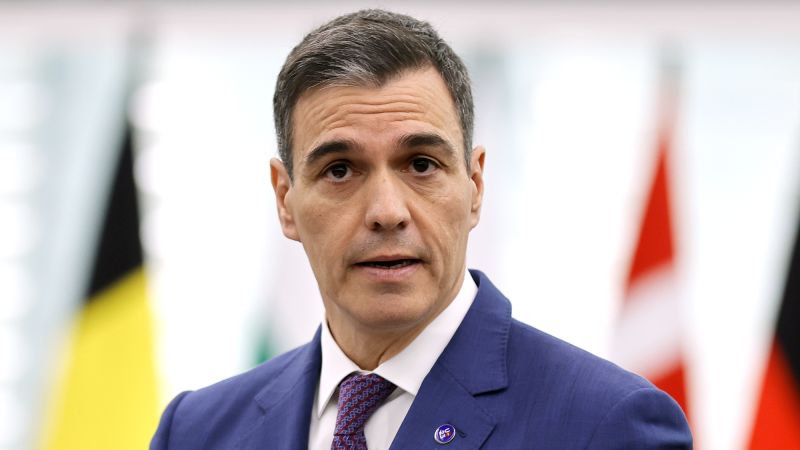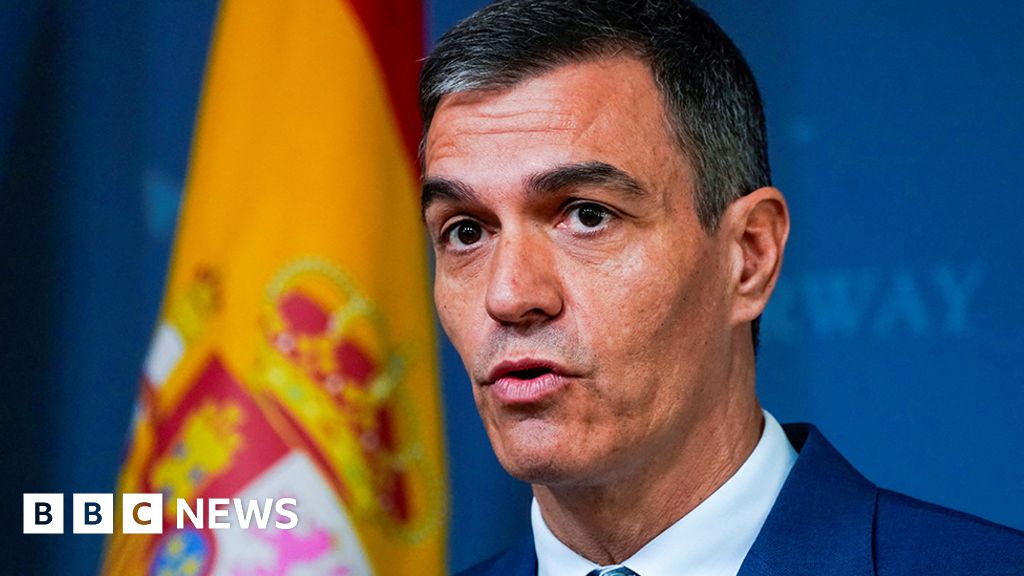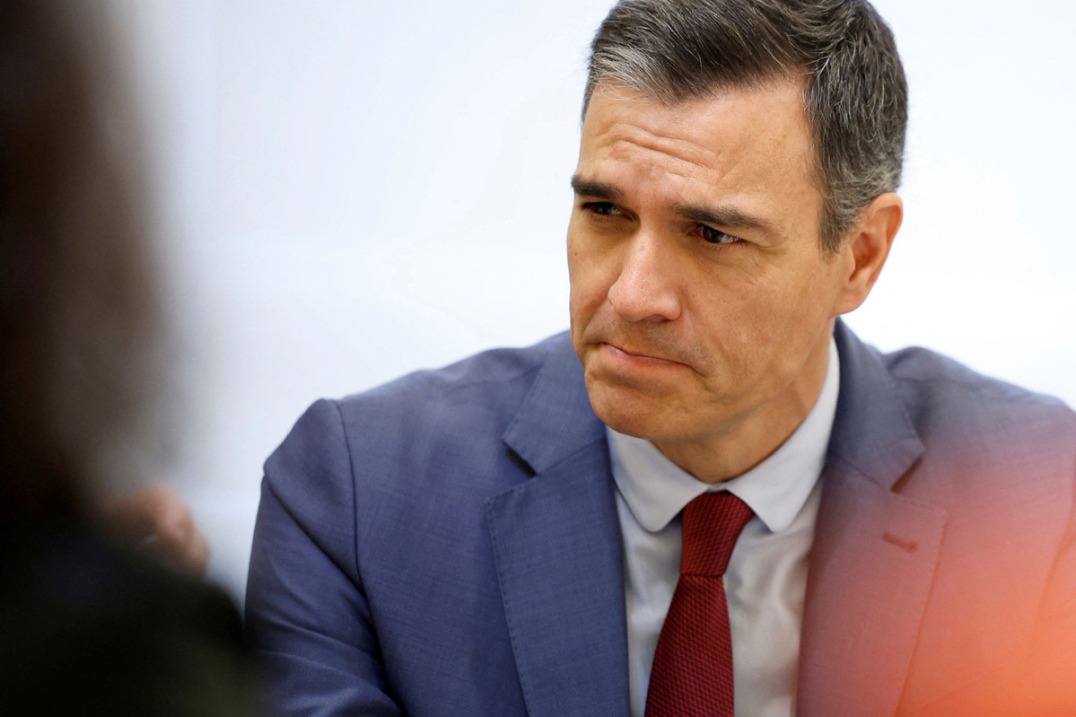
Spanish Prime Minister Pedro Sanchez has announced he will not resign amidst a corruption investigation involving his wife, Begona Gomez, attributing the inquiry to rival conservative political forces. After five days of reflection, Sanchez determined to continue leading the government, citing support from solidarity rallies organized by his backers. The investigation was initiated by a criminal complaint from the Clean Hands group with alleged ties to Spain's far right. The situation occurred amid political tensions in Madrid as the European Union elections and the Catalan regional election approached.

Spanish Prime Minister Pedro Sanchez is contemplating stepping down due to a judicial probe against his wife, Begona Gomez, on corruption allegations. Sanchez blames the probe on attacks by right and far-right opponents, calling it a smear campaign. Thousands of Spanish journalists and writers have expressed support for Sanchez and his wife, condemning the alleged campaign of hoaxes and harassment. The legal complaint against Gomez was filed by a far-right group, Manos Limpias, accusing her of using her influence in business deals.

Spain is on edge awaiting Prime Minister Pedro Sanchez's decision on whether to resign amid a corruption scandal involving his wife. Sanchez's temporary withdrawal from public life has sparked debates among citizens, with some advocating for his resignation for setting an example of accountability, while others view it as a political maneuver to outmaneuver opposition. The speculation arises as Sanchez grapples with accusations against his wife and challenges in leading a fragile left-wing coalition government.

Prime Minister Pedro Sanchez of Spain announced a pause in his public duties to contemplate his role following a court probe into his wife for influence peddling and corruption, initiated by far-right group Clean Hands. Sanchez will reveal his decision on Monday and stated his wife will cooperate with the investigation. The opposition views this as a strategic move by Sanchez amidst his coalition government's delicate majority. The investigation stems from complaints by right-wing sources, notably affecting Sanchez's contemplation on continuing to lead the government.

In the era of social media and 24 hour news cycles, people expect instant, up to the minute information. However, Spanish prime minister Pedro Sanchez chose to announce a five day pause in his duties via a lengthy four page letter . He will use this time to reflect on whether he will remain at the head of Spains government following a corruption investigation being opened into his wife, Begona Gomez. In doing so, he has sparked a crisis of government in which he already has the upper hand, controlling both the timing and the agenda of political debate. As expected, the announcement dominated the front pages of Spanish newspapers, and hit the headlines in many international media outlets.

PP leader accuses prime minister of navel-gazing, while Sanchezs supporters rally in Madrid Spanish opposition parties have stepped up their attacks on the socialist prime minister, Pedro Sanchez, as he prepares to announce whether he will resign because of what he describes as a harassment and bullying operation being waged against him and his wife by his political and media enemies. Sanchez shocked Spain on Wednesday night when he published a letter announcing that he would abandon his public duties for five days while he weighed up whether to step down, adding that he would reveal his decision on Monday. Earlier on Wednesday, a Madrid court had said it had opened a preliminary investigation into Sanchezs wife, Begona Gomez, for the alleged offence of influence peddling and corruption. The investigation followed a complaint from the pressure group Manos Limpias (Clean Hands), a self-styled trade union with far right links that has a long history of using the courts to pursue those it deems to be acting against Spains democratic interests. In his letter, Sanchez said the Manos Limpias complaint was based on alleged reporting by news sites whose political leanings he described as overtly rightwing and far right, adding: As is only logical, Begona will defend her honour and will cooperate with the justice system as much as is necessary to clear up facts that are as scandalous in appearance as they are nonexistent.

Socialist leader Pedro Sanchez has secured a four-seat majority in the 350-seat chamber of parliament to continue leading Spain as prime minister after sealing an amnesty deal for Catalan politicians involved in a secession bid. The amnesty deal aims to 'heal wounds' but has sparked controversy, with opponents fearing further secession attempts. Sanchez's reliance on Catalan pro-independence parties has faced criticism, triggering protests and accusations of pursuing personal interests over the country's. The Popular Party's leader Alberto Nunez Feijoo failed to form a majority, leading to Sanchez's re-election.

Prosecutors in Spain are appealing a court's decision to look into a corruption case against Prime Minister Pedro Sanchez's wife, Begona Gomez, based on a complaint by an anticorruption group. The group, Manos Limpias (Clean Hands), admitted to relying on media reports for the case and cannot vouch for their accuracy. Sanchez announced a break from public duties amidst the allegations, attributing them to slander from the right and far right. The group's head denied political motives behind the suit, emphasizing it was driven by journalistic reports.

The premiership of Pedro Sánchez began when Sánchez was sworn in as Prime Minister of Spain by King Felipe VI on 2 June 2018 and is currently ongoing. He is the first prime minister in the recent Spanish history to reach the premiership after succeeding in a vote of no confidence against a ruling prime minister. He was also the first prime minister elected by Parliament without being a member of parliament.During his speech as alternative candidate in the vote of no confidence, he said he planned to form a government that would eventually dissolve the Cortes Generales and call for a general election, but he did not specify when he would do it while also saying that before calling for an election he intended take a series of measures like increasing unemployment benefits and proposing a law of equal pay between the sexes. However, he also said he would uphold the 2018 budget made by the Rajoy government, a condition the Basque Nationalist Party imposed to vote for the motion of no-confidence. Eventually, Sánchez was forced to resign when Parliament rejected the 2019 budget bill and he called for snap election.After two general elections, in January 2020 Sánchez reached an agreement with the far-left Unidas Podemos electoral alliance, forming Spain's first coalition government since the Second Republic (1931–1939). On 7 October 2020, Sanchez presented a financial plan for the remainder of his term in office that went beyond drafting a new budget and predicted the creation of 800,000 jobs over the next three years. He did not manage to finish his term, as he resigned again after the bad electoral results of the May 2023 local and regional elections, and asked the King to dissolve Parliament. Following the general election on 23 July 2023, Sánchez once again formed a coalition government, this time with Sumar (successors of Unidas Podemos).Sánchez's premiership has been marked by several international events that have harmed Spanish interests, such as the COVID-19 pandemic, the fall of Kabul, the Russian invasion of Ukraine, the political instability in Latin America and the conflict between Hamas and Israel, among others. At the same time, domestic events such as the Storm Filomena and the Cumbre Vieja volcanic eruption has also caused trouble to his premiership. In any case, Sánchez's policies have had a markedly pro-European character, and the prime minister's economic policy has been characterized by an increase in public spending and taxes, as well as direct opposition to the austerity policy carried out during the 2008–2014 Spanish financial crisis. Equality has been one of the most important elements, having promoted new laws against sexual assaults, an expansion of the abortion law and the approval of the trans law. In this sense, Sánchez has always maintained a balanced cabinet of men and women.Sánchez's premiership has been one of continuous confrontations with the opposition, which has harshly criticized criticized for his pacts with regional parties, mainly of pro-independence or nationalist ideology. These criticisms increased with the formation of his third government, since measures such as an amnesty law for Catalan independentists condemned by the 2017 illegal independence referendum caused numerous protests in the streets.

Pedro Sánchez Pérez-Castejón (Spanish pronunciation: [ˈpeðɾo ˈsantʃeθ ˈpeɾeθ kasteˈxon]; born 29 February 1972) is a Spanish politician who has been Prime Minister of Spain since June 2018. He has also been Secretary-General of the Spanish Socialist Workers' Party (PSOE) since June 2017, having previously held that office from 2014 to 2016, and was elected President of the Socialist International in November 2022.Sánchez began his political career in 2004 as a city councillor in Madrid, before being elected to the Congress of Deputies in 2009. In 2014, he was elected Secretary-General of the PSOE, becoming Leader of the Opposition. He led the party through the inconclusive 2015 and 2016 general elections, but resigned as Secretary-General shortly after the latter, following public disagreements with the party's executive. He was re-elected in a leadership election eight months later, defeating internal rivals Susana Díaz and Patxi López.On 1 June 2018, the PSOE called a vote of no confidence against Prime Minister Mariano Rajoy, successfully passing the motion after winning the support of Unidas Podemos, as well as various regionalist and nationalist parties. Sánchez was appointed prime minister by King Felipe VI the following day. He went on to lead the PSOE to gain 38 seats in the April 2019 general election, the PSOE's first national victory since 2008, although they fell short of a majority. After talks to form a government failed, Sánchez again won the most votes at the November 2019 general election, forming a minority coalition government with Unidas Podemos, the first national coalition government since the country's return to democracy. After the PSOE suffered significant losses in regional elections in May 2023, Sánchez called a snap general election, which saw the PSOE hold all of its seats; despite finishing second behind the People's Party, Sánchez was able to again form a coalition government, and was appointed to a third term as Prime Minister on 17 November 2023.

The prime minister of Spain, officially president of the Government (Spanish: Presidente del Gobierno), is the head of government of Spain. The prime minister chairs the Council of Ministers and nominates its ministers; in these sense, the prime minister establishes the Government policies and coordinates the actions of the Cabinet members. As chief executive, the prime minister also advises the monarch on the exercise of their royal prerogatives.Although it is not possible to determine when the position actually originated, the office of prime minister has evolved throughout history to what it is today. It was formally regulated for the first time in 1823, when King Ferdinand VII appointed his Secretary of State (the name that the position received then) as chair of the extant Council of Ministers. The current office was established during the reign of King Juan Carlos I, in the Constitution of 1978 which describes the prime minister's constitutional role and powers, how the prime minister accedes to, and is removed from office, and the relationship between the prime minister and Parliament.Upon a vacancy, the monarch nominates a candidate for a vote of confidence by the Congress of Deputies, the lower house of the Cortes Generales. The process is a parliamentary investiture by which the head of government is indirectly elected by the elected Congress of Deputies. In practice, the prime minister is almost always the leader of the largest party in the Congress, although not necessarily. The prime minister's official residence and office is Moncloa Palace in Madrid.Pedro Sánchez, of the Spanish Socialist Workers' Party (PSOE), has been prime minister since 2 June 2018, after a successful motion of no confidence against former prime minister Mariano Rajoy. Since then, Sánchez has chaired three different cabinets, the most —along with Adolfo Suárez— just behind fellow socialist Felipe González, prime minister from 1982 to 1996. King Felipe VI re-appointed Sánchez for the third time on 17 November 2023 after he reached a government agreement with political coalition Sumar and gathered the support of other minor parties. His third government took office on 21 November 2023.

The third government of Pedro Sánchez was formed on 21 November 2023, following the latter's election as Prime Minister of Spain by the Congress of Deputies on 16 November and his swearing-in on 17 November, as a result of the Spanish Socialist Workers' Party (PSOE) and Sumar being able to muster a majority of seats in the Parliament with external support from Republican Left of Catalonia (ERC), Together for Catalonia (Junts), EH Bildu, the Basque Nationalist Party (PNV), the Galician Nationalist Bloc (BNG) and Canarian Coalition (CCa) following the 2023 general election. It succeeded the second Sánchez government and is the incumbent Government of Spain since 21 November 2023, a total of 156 days.The cabinet comprises members of the PSOE (including its sister party, the Socialists' Party of Catalonia, PSC) and Sumar—with the involvement of Unite Movement (SMR), United Left (IU), the Communist Party of Spain (PCE), More Madrid (MM) and Catalonia in Common (CatComú)—as well as independents proposed by both parties.

A Spanish judge has reopened an investigation into the alleged spying on the cellphone of Spain's prime minister after collaborating with a similar French investigation. The probes involve the use of Pegasus spyware by the Israeli NSO Group, known for targeting activists and journalists in 50 countries. Spain and France are actively investigating cases of alleged espionage involving high-profile government officials like Prime Minister Pedro Sanchez and French President Emmanuel Macron.

Sánchez is a Spanish family name.

Spain's parliament has agreed to consider legislation that could grant residency and work permits to hundreds of thousands of foreigners living in Spain without proper documentation. The proposal, brought by a citizen initiative with widespread support, aims to provide legal status to immigrants from Latin America and Africa, enabling them to live, work, pay taxes, access healthcare, and contribute to Social Security. The bill seeks to address the vulnerability and exploitation faced by these individuals working in essential but low-paid jobs in the underground economy. Additionally, Spain plans to eliminate golden visas for wealthy non-EU residents investing in real estate.

María Begoña Gómez Fernández (born 1975) is a Spanish marketing expert and wife of Pedro Sánchez Pérez-Castejón, the Prime Minister of Spain.

Spanish Prime Minister Pedro Sanchez, along with leaders from Ireland and Norway, expressed intentions to recognise Palestine as a state, with plans to coordinate with other European nations. The move aims to support a two-state solution in the Israel-Palestine conflict amid growing international criticism of Israel's actions in Gaza. Norway, part of the Schengen zone, also stands ready to recognise Palestine and has a history of hosting peace talks in the region. Spain and Ireland have been vocal critics of Israel's war in Gaza, supporting Palestinian statehood and advocating for a peaceful future.

Spain has approved a plan to compensate victims of sex abuse by individuals linked to the Catholic Church, with an estimated 440,000 adults affected, half of whom were abused by clergy. The compensation, funded by the church, aims to address past negligence and provide legal assistance over the next four years. Despite approval, Spain's Bishops Conference has criticized the plan for alleged discrimination against victims outside church circles. The government intends to collaborate with the church to implement the plan, which includes a public act of recognition and prevention measures in schools.







https://www.theguardian.com/profile/samjones

https://www.theguardian.com/profile/lili-bayer,https://www.theguardian.com/profile/samjones

NY Post

Washington Post

ABC News

ABC News

Yahoo! News

贺霞婷

By CIARÁN GILES and JOSEPH WILSON

NBC

https://www.facebook.com/bbcnews

Al Goodman, Jack Guy

Al Jazeera

PANORA

PANORA

PANORA

PANORA

PANORA

PANORA

PANORA

Wikipedia

Wikipedia

Wikipedia

Wikipedia

PANORA

Wikipedia

PANORA

Wikipedia

PANORA

PANORA